Attack
of the
50 Foot
Blockchain
Bitcoin, Blockchain,
Ethereum and Smart Contracts
David Gerard
Copyright 2017 David Gerard. All rights reserved. No part of this book may be reproduced or transmitted in any form or by any means, electronic or mechanical, including photocopying, recording, or by any information storage and retrieval system without the written permission of the author, except where permitted by law.
A Bitcoin FAQ 2013 Christian Wagner, used with permission. (This section is also available for reuse under Creative Commons Attribution-NonCommercial-ShareAlike 3.0 Unported [cc-by-nc-sa].)
Stages in a Bubble 2008 Jean-Paul Rodrigue, released by the author for any reuse with attribution.
Skunk House photograph 2016 Karen Boyd, used with permission.
Mr. Bitcoin photograph 2014 N00ba the Hutt, used with permission.
Mining rig photograph of unknown origin; if this is yours, please get in touch.
First edition, July 2017
Book site: www.davidgerard.co.uk/blockchain
Contact the author:
Cover art and design: Alli Kirkham www.punkpuns.com/author
Contents
A Bitcoin FAQ
Christian Wagner
http://brokenlibrarian.org/bitcoin/
Short Version
1) Should I buy Bitcoins?
No.
2) But I keep seeing all this stuff in the news about them and how
No. Tech journalism is uniformly terrible, always remember this.
3) How does this work? It doesnt make any sense!
No, it really doesnt. Its impossible to accurately explain Bitcoin in anything less than mind-numbingly boring technical terms so you should probably just not worry about it. Go do something useful instead.
Introduction
Abstract: A purely peer-to-peer version of electronic cash would allow online payments to be sent directly from one party to another without going through a financial institution.
Satoshi Nakamoto, Bitcoin: A Peer-to-Peer Electronic Cash System, 2008
An experimental new Internet-based form of money is created that anyone can generate at home. People build frightening firetrap computers full of video cards, putting out so much heat that one operator is hospitalised with heatstroke and brain damage.
Someone known only as Pirateat40 starts a high yield investment program. Just before its collapse as a Ponzi scheme, it holds 7% of all bitcoins at the time. Aggrieved investors eventually manage to convince the authorities not only that these Internet tokens are worth anything, but that they gave them to some guy on an Internet forum calling himself Pirate because he said he would double their money.
A young physics student starts a revolutionary new marketplace based on the nonaggression principle, immune to State coercion. He ends up ordering hits on people because they might threaten his great experiment, and is jailed for life without parole.
A legal cryptographer proposes fully automated contractual systems that run with minimal human interference, so that business and the law will work better and be more trusted. The contracts people actually write are automated Ponzi schemes, though they later progress to unregulated penny stock offerings whose fine print literally states that you are buying nothing of any value.
The biggest crowdfunding in history attracts $150 million on the promise that it will embody the steadfast iron will of unstoppable code. Upon release it is immediately hacked, and $50 million is stolen.
Bitcoins good name having been somewhat stained by drugs and criminals, its advocates try to sell the technology to business as Blockchain. $1.5 billion of venture capital gets back, so far, zero. The main visible product is consultant hours and press releases.
How did we get here?
Digital cash, without having to check in with a central authority, is obviously a useful idea. It turned out in practice to be a magnet for enthusiastic amateurs with stars in their eyes and con artists to prey upon them, with outcomes both hilarious and horrifying.
Bitcoin and blockchains are not a technology story, but a psychology story: bubble economy thinking and the art of the steal.
Despite the creators good intentions, the cryptocurrency field is replete with scams and scammers. The technology is used as an excuse to make outlandish near-magical claims. When phrases like a whole new form of money or the old rules dont apply any more start going around, people get gullible and the ethically-challenged get creative.
You can make money from Bitcoin! But it is vastly more likely that you will be the one that others make their money from.
Remember: if it sounds too good to be true, it almost certainly is.
In this book, I cover the origins and history of Bitcoin to the present day, with some of the important stories, the other cryptocurrencies it spawned particularly Ethereum and smart contracts and the attempts to apply blockchains to business. Theres also a case study on blockchains in the music industry.
I go into technical detail where its relevant, though whats more important are the implications. There are also extensive footnotes, with links in the digital edition to the sources for further reading, and a glossary.
Chapter 1: What is a bitcoin?
Why Bitcoin?
Paper notes and metal coins are annoying and inconvenient, and we have the Internet now. So digital money sounds like a useful idea.
The solution the developed world has mostly come to is just using our banks you have an account, and you can move money to other peoples accounts, via debit card, credit card, PayPal or whatever. The central authority means its sensibly regulated, errors and thefts can be reversed and so on. Its also a smooth transition from paper money the same thing, but you can do new things with it.
But this isnt a complete solution; a shops card reader could be down, your payment gateway might charge fees, you may want to send money to someone not on the same banking network, you value your privacy, checking in with your bank every time gets annoying. So a form of digital cash would be nice too.
Bitcoin is a cryptocurrency: a thing on the Internet which lets you exchange unique digital objects. The objects would take approximately forever to fake; so if we assign the objects a value, we can exchange them in a manner something like we do money. Its decentralised, so you can send money without having to go through a central clearing house.
Bitcoins transaction ledger, the blockchain, is touted as immutable: nobody can alter it without it being obvious that it was tampered with. The idea is that theres no central control, anyone can run a Bitcoin node and be part of the network, nobody can block or reverse your transactions and you dont have to take anyones word for the state of the system.
What you have when you have a bitcoin
You know what feels like money to you. You can earn it, you can spend it on all manner of things, you can save it for the future, you can invest it. It might be in a bank account with a card, or notes and coins in your pocket it still feels like a pound or a dollar to you.
In practice, bitcoins are a bit like money in a bank account with a debit card, except without any sort of safety net its all unregulated and uninsured, theres no way to reverse a transaction, and theres no customer service.
If you have bitcoins, you dont actually have them as things on your computer. What youve got is a Bitcoin address (like a bank account number) and the key to that address (another number, which works like the PIN to the first number). The Bitcoin address is mentioned in transactions on the blockchain; the key is the unique thing you have that makes your bitcoins yours.
To send bitcoins from your address to another address (a bit like sending money over PayPal), you generate a transaction that is sent out into the network and added to the next block of transactions. Once its in a block, that transaction is publicly visible on the blockchain forever.
Next page
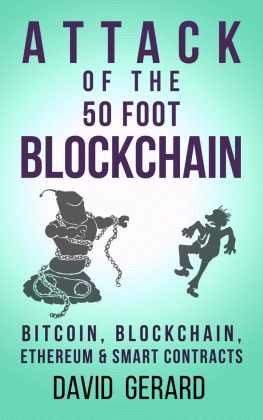
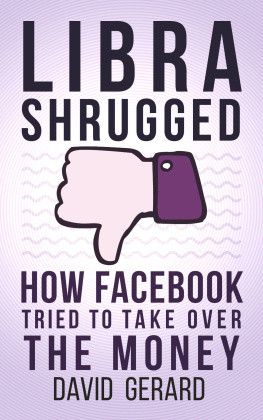

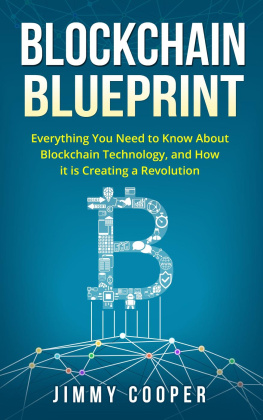
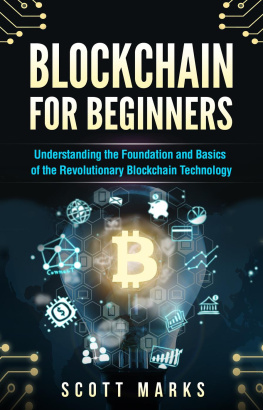

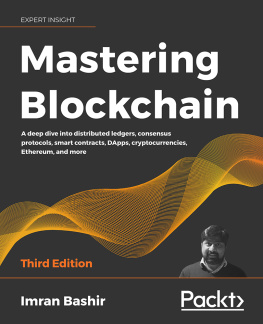

![Bellaj Badr [Bellaj Badr] - Blockchain By Example](/uploads/posts/book/119701/thumbs/bellaj-badr-bellaj-badr-blockchain-by-example.jpg)
![Kenny Vaneetvelde [Kenny Vaneetvelde] - Ethereum Projects for Beginners](/uploads/posts/book/119688/thumbs/kenny-vaneetvelde-kenny-vaneetvelde-ethereum.jpg)
![Fatima Castiglione Maldonado [Fatima Castiglione Maldonado] - Introduction to Blockchain and Ethereum](/uploads/posts/book/119687/thumbs/fatima-castiglione-maldonado-fatima-castiglione.jpg)